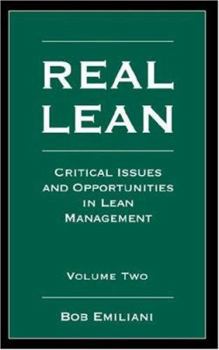Real Lean: Critical Issues and Opportunities in Lean Management (Volume Two
Select Format
Select Condition 
Book Overview
In REAL LEAN - Critical Issues and Opportunities in Lean Management (Volume Two), Bob Emiliani helps Lean management practitioners gain a greater awareness of the challenges they face when... This description may be from another edition of this product.
Format:Paperback
Language:English
ISBN:0972259147
ISBN13:9780972259149
Release Date:July 2007
Publisher:Clbm, LLC
Length:200 Pages
Weight:0.55 lbs.
Dimensions:0.5" x 5.0" x 8.0"
Related Subjects
Business Business & Investing Economics Leadership Management Management & LeadershipCustomer Reviews
2 ratings
Required Reading for Executives
Published by Thriftbooks.com User , 15 years ago
The four books comprising the "Real Lean" series by Bob Emiliani are masterful and important. I would recommend that the executive leadership teams of any company with aspirations to using lean methods study these books carefully. The books do not have a simple formulaic set of steps to lean success - although there is plenty of practical advice from successful lean organizations - but raises the important and challenging questions. The success or failure of lean transformation starts and stops with the active, hands-on, commitment from the executive team. The move to lean management is at a crucial point within western organizations. According to one survey, 52% of US manufacturing companies are "going lean". Lean thinking is beginning to have an impact on service industries, banking, insurance, healthcare, and even construction. And yet the outcome of all this lean activity is paltry in comparison to the potential benefits that come to organizations truly embracing lean thinking and striving to become a lean enterprise. Emiliani's previous book - Better Thinking, Better Results - told the story of a company that truly embraced lean thinking and showed the radical impact on the company's operations, sales, growth, and financial results. Toyota continues to out-do it's competitors on almost every important aspect of it's business. And there are a many notable companies where true lean transformation has resulted in dramatic and consistent, long-term excellence. But these companies are the minority. One of the most important questions for US and European industry at this time is this: "What must be in place for us to become a truly lean enterprise?" The "Real Lean" series of books addresses this question. Those of us working with lean companies have seen countless examples of (what Emiliani terms) "fake lean". This is where the company has set up teams of people to implement the tools and methods of lean, but have made no fundamental change in the company's outlook or culture. Lean is thought of as a set of tools that can be applied to the company's operations; manufacturing, service, product development, and so forth. Middle managers are trained, and projects initiated. The projects are now called kaizens and improvement is made fast and furious. The result of these activities is that there is quick and tangible operational improvement, and everybody is pleased. But this does not lead to the radical and break-through changes accompanying "real lean". Why is this? The reason (in my opinion) for limited results is that this is not lean thinking at all. Lean thinking starts with a focus on customer value; fake lean companies continue to focus on the stock-price, profitability, and the owners. Lean thinking has an end-to-end focus on the value streams that create the customer value; fake lean companies do largely uncoordinated "point kaizen" improvement and speak about low-hanging fruit. Lean thinking requires a passionate commitment to flow;
Essays on Lean
Published by Thriftbooks.com User , 16 years ago
Bob Emiliani is the author of the excellent "Better Thinking Better Results". In "Real Lean" Volumes 1 and 2 he turns his attention to a series of short essays on a broad range of areas in lean management. His arguments stress that "real lean" comprises both continuous improvement and respect for people (not just the former). He skilfully shows the roots of lean going back 100 years to Scientific Management, as well as exploring the original Japanese texts on lean from the 1980's. Waste in business, for example, is a topic that first received attention in 1925 !. Bob Emiliani also highlights the key elements in successful lean transformation and marks out the potential pitfalls and challenges any implementation may face. The books provide an eclectic mix of essays covering a very broad range of material. They are all interesting and well written, though, if I have any criticism it is that the books lack a real focus (I would like more on how to counter the barriers identified); and probably dwell too much on the literature of the early 1900's. The books frequently touch on the undesirable management behaviours of today's "I win you lose" world. He doesn't really give any ideas how to deal with these problems. However, I understand a third volume of "Real Lean" is due out soon and Bob's next book after that will be "Practical Lean Leadership" due in early 2008. I await these next steps with interest. If you are an academic, student of lean, consultant or practitioner, these books are an engaging, thought provoking and easy read. They will give you a broader awareness of the evolution of lean though there is nothing here about doing lean on the shopfloor.





